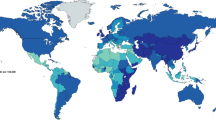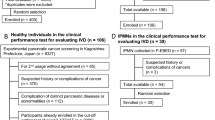Abstract
Caveolin-1, a candidate tumor suppressor, interacts with a number of transducing molecules and plays a regulatory role in several signaling pathways. Recently, a study revealed that Cav-1 G14713A (rs3807987)/T29107A (rs7804372) polymorphisms might be associated with the susceptibility to certain cancers. In this study, we evaluated the interaction among Caveolin-1 genotypes (rs3807987/rs7804372) and Helicobacter pylori infection and increased risk of gastric cancer among the Chinese population. Blood specimens were collected from 412 gastric cancer cases to 412 noncancer controls between January 2004 and December 2012 in Liaoning Province, China. Caveolin-1 genotypes (rs3807987/rs7804372) were determined by matrix-assisted laser desorption/ionization time-of-flight mass spectrometry. Enzyme-linked immunosorbent assays were used to measure serum levels of anti-H. pylori IgG. Odds ratio and 95 % confidence interval were calculated using multivariate logistic regression adjusted by sex and age. There were significant differences between gastric cancer and control groups in the distribution of their genotypes and allelic frequencies of the Cav-1 G14713A (rs3807987) and T29107A (rs7804372) polymorphisms, respectively. An elevated risk of gastric cancer was observed in patients with H. pylori infection combined with the Cav-1 G14713A, but not T29107A genotypes. The A allele of G14713A shows an interaction with H. pylori infection that increases the risk of gastric cancer.
Similar content being viewed by others
References
Jemal A, Bray F, Center MM, Ferlay J, Ward E, Forman D. Global cancer statistics. CA Cancer J Clin. 2011;61:69–90.
Chen W, Zheng R, Zhang S, Zhao P, Li G, Wu L, et al. Report of incidence and mortality in China cancer registries, 2009. Chin J Cancer Res. 2013;25:10–21.
Duell EJ, Sala N, Travier N, Muñoz X, Boutron-Ruault MC, Clavel-Chapelon F, et al. Genetic variation in alcohol dehydrogenase (ADH1A, ADH1B, ADH1C, ADH7) and aldehyde dehydrogenase (ALDH2), alcohol consumption and gastric cancer risk in the European Prospective Investigation into Cancer and Nutrition (EPIC) cohort. Carcinogenesis. 2012;33:361–7.
Bhayal AC, Prabhakar B, Rao KP, Penchikala A, Ayesha Q, Jyothy A, et al. Role of transforming growth factor-β1–509 C/T promoter polymorphism in gastric cancer in south Indian population. Tumour Biol. 2011;32:1049–53.
Otani T, Ikeda S, Lwin H, Arai T, Muramatsu M, Sawabe M. Polymorphisms of the formylpeptide receptor gene (FPR1) and susceptibility to stomach cancer in 1531 consecutive autopsy cases. Biochem Biophys Res Commun. 2011;405:356–61.
Francisco G, Menezes PR, Eluf-Neto J, Chammas R. Arg72Pro TP53 polymorphism and cancer susceptibility: a comprehensive meta-analysis of 302 case–control studies. Int J Cancer. 2011;129:920–30.
Ju H, Lim B, Kim M, Noh SM, Kim WH, Ihm C, et al. SERPINE1 intron polymorphisms affecting gene expression are associated with diffuse-type gastric cancer susceptibility. Cancer. 2010;116:4248–55.
Zhang Y, Sun LP, Xing CZ, Xu Q, He CY, Li P, et al. Interaction between GSTP1 Val allele and H. pylori infection, smoking and alcohol consumption and risk of gastric cancer among the Chinese population. PLoS One. 2012;7:e47178.
Glenney Jr JR. Tyrosine phosphorylation of a 22-kDa protein is correlated with transformation by Rous sarcoma virus. J Biol Chem. 1989;264:20163–6.
Guan TH, Chen G, Gao B, Janssen MR, Uttarwar L, Ingram AJ, et al. Caveolin-1 deficiency protects against mesangial matrix expansion in a mouse model of type 1 diabetic nephropathy. Diabetologia. 2013;56:2068–77.
Gildea JJ, Kemp BA, Howell NL, Van Sciver RE, Carey RM, Felder RA. Inhibition of renal caveolin-1 reduces natriuresis and produces hypertension in sodium-loaded rats. Am J Physiol Renal Physiol. 2011;300:F914–20.
Bosch M, Mari M, Herms A, Fernandez A, Fajardo A, Kassan A, et al. Caveolin-1 deficiency causes cholesterol-dependent mitochondrial dysfunction and apoptotic susceptibility. Curr Biol. 2011;21:681–6.
Wiechen K, Sers C, Agoulnik A, Arlt K, Dietel M, Schlag PM, et al. Down-regulation of caveolin-1, a candidate tumor suppressor gene, in sarcomas. Am J Pathol. 2001;158:833–9.
Han SE, Park KH, Lee G, Huh YJ, Min BM. Mutation and aberrant expression of Caveolin-1 in human oral squamous cell carcinomas and oral cancer cell lines. Int J Oncol. 2004;24:435–40.
Song Y, Xue L, Du S, Sun M, Hu J, Hao L, et al. Caveolin-1 knockdown is associated with the metastasis and proliferation of human lung cancer cell line NCI-H460. Biomed Pharmacother. 2012;66:439–47.
Nohata N, Hanazawa T, Kikkawa N, Mutallip M, Fujimura L, Yoshino H, et al. Caveolin-1 mediates tumor cell migration and invasion and its regulation by miR-133a in head and neck squamous cell carcinoma. Int J Oncol. 2011;38:209–17.
Tse EY, Ko FC, Tung EK, Chan LK, Lee TK, Ngan ES, et al. Caveolin-1 overexpression is associated with hepatocellular carcinoma tumourigenesis and metastasis. J Pathol. 2012;226:645–53.
Yang SF, Yang JY, Huang CH, Wang SN, Lu CP, Tsai CJ, et al. Increased caveolin-1 expression associated with prolonged overall survival rate in hepatocellular carcinoma. Pathology. 2010;42:438–45.
Rajjayabun PH, Garg S, Durkan GC, Charlton R, Robinson MC, Mellon JK. Caveolin-1 expression is associated with high-grade bladder cancer. Urology. 2001;58:811–4.
Sugie S, Mukai S, Tsukino H, Toda Y, Yamauchi T, Nishikata I, et al. Increased plasma caveolin-1 levels are associated with progression of prostate cancer among Japanese men. Anticancer Res. 2013;33:1893–7.
Steiner I, Jung K, Miller K, Stephan C, Erbersdobler A. Expression of endothelial factors in prostate cancer: a possible role of caveolin-1 for tumour progression. Oncol Rep. 2012;27:389–95.
Wang CH, Lai YL, Chang WS, Wu KH, Lane HY, Chiu CF, et al. Significant association of caveolin-1 single nucleotide polymorphisms with childhood leukemia in Taiwan. Cancer Genomics Proteomics. 2013;10:75–9.
Sugie S, Tsukino H, Yamauchi T, Mukai S, Fujii M, Shibata N, et al. Functional polymorphism in the CAV1 T29107A gene and its association with prostate cancer risk among Japanese men. Anticancer Res. 2013;33:1023–7.
Hsu CM, Yang MD, Tsai CW, Ho CY, Chang WS, Chang SC, et al. The contribution of caveolin-1 genotype and phenotype to hepatocellular carcinoma. Anticancer Res. 2013;33:671–7.
Tsou YA, Tsai CW, Tsai MH, Chang WS, Li FJ, Liu YF, et al. Association of caveolin-1 genotypes with nasopharyngeal carcinoma susceptibility in Taiwan. Anticancer Res. 2011;31:3629–32.
Liu LC, Su CH, Wang HC, Tsai CW, Chang WS, Ho CY, et al. Significant association of caveolin-1 (CAV1) genotypes with breast cancer in Taiwan. Anticancer Res. 2011;31:3511–5.
Bau DT, Chang CH, Tsai RY, Wang HC, Wang RF, Tsai CW, et al. Significant association of caveolin-1 genotypes with bladder cancer susceptibility in Taiwan. Chin J Physiol. 2011;54:153–60.
Wu HC, Chang CH, Tsou YA, Tsai CW, Lin CC, Bau DT. Significant association of caveolin-1 (CAV1) genotypes with prostate cancer susceptibility in Taiwan. Anticancer Res. 2011;31:745–9.
Bau DT, Tsai MH, Tsou YA, Wang CH, Tsai CW, Sun SS, et al. The association of Caveolin-1 genotypes with oral cancer susceptibility in Taiwan. Ann Surg Oncol. 2011;18:1431–8.
Yang MD, Tsai RY, Liu CS, Chang CH, Wang HC, Tsou YA, et al. Association of Caveolin-1 polymorphisms with colorectal cancer susceptibility in Taiwan. World J Gastrointest Oncol. 2010;2:326–31.
Tanaka A, Kamada T, Inoue K, Shiotani A, Kusunoki H, Manabe N, et al. Histological evaluation of patients with gastritis at high risk of developing gastric cancer using a conventional index. Pathol Res Pract. 2011;207:354–8.
Cui J, Rohr LR, Swanson G, Speights VO, Maxwell T, Brothman AR. Hypermethylation of the caveolin-1 gene promoter in prostate cancer. Prostate. 2001;46:249–56.
Pandey R, Misra V, Misra SP, Dwivedi M, Kumar A, Tiwari BK. Helicobacter pylori and gastric cancer. Asian Pac J Cancer Prev. 2010;11:583–8.
Sugiyama T, Asaka M. Helicobacter pylori infection and gastric cancer. Med Electron Microsc. 2004;37:149–57.
Acknowledgments
This research was supported by a grant from the National Natural Science Foundation of China (nos. 81270036) and Science and Technology project of Liaoning Province (nos. 2013021057)
Conflicts of interest
None
Author information
Authors and Affiliations
Corresponding author
Rights and permissions
About this article
Cite this article
Zhang, Y., Hu, Xj., Zhang, Ll. et al. Interaction among Caveolin-1 genotypes (rs3807987/rs7804372), H. pylori infection, and risk of gastric cancer in a Chinese population. Tumor Biol. 35, 1511–1516 (2014). https://doi.org/10.1007/s13277-013-1208-y
Received:
Accepted:
Published:
Issue Date:
DOI: https://doi.org/10.1007/s13277-013-1208-y




